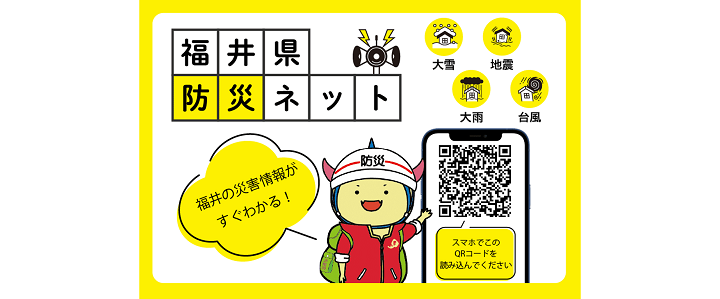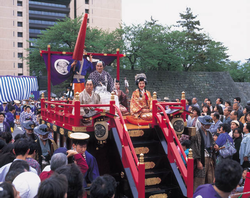Fukui Friendship Ambassador Newsletter 2007 Vol.2
Greetings everyone!
The cherry blossoms have come and gone here in Fukui, and though they didn't last too long, the ruins of the Fukui Castle and the Asuwa River were quite pretty.
In other news, the Echizen Historical Parade was held recently as part of the annual Fukui Spring Festival. As you can see from the picture, local residents dress up as samurai and other historical figures and parade around Fukui City. This is a large event, with over 1,100 people participating. This year is the 1,500th anniversary of the ascension to the throne by Emperor Keitai, who used Fukui as a stronghold, so this year a parade with traditional Japanese music was also held to commemorate his ascension. Did you have a chance to see the Echizen Historical Parade when you were in Fukui?
Fukui and beyond...
- Japanese baby boomers reach retirement age; mass exodus from work force begins
- The Japanese baby boomers were born after the end of World War Two, between 1947 and 1949, and as the birth rate was high during those years, their generation represents a large segment of the population. Those born in 1947 turn 60 this year, and as 60 is the standard retirement age in Japan, a mass exodus from the work force has begun. Fearing the sudden loss of highly skilled workers, some companies are taking measures such as extending the retirement age.
- As for life after retirement, many baby boomers appear to be worried about whether they can make ends meet by relying only on their retirement bonus, annual pension, and savings. According to a survey on life after retirement among baby boomers carried out by Macromill, 85% of baby boomers plan to look for another job after retiring, with 70% of them citing financial reasons.
- First "Baby Hatch" in Japan approved
- Jikei Hospital in Kumamoto City will construct a "Baby Hatch" where newborns can be dropped off anonymously. Though it provoked extended debate, this controversial "Baby Hatch" is scheduled to begin operating in May.
- Some places in Europe have such facilities in place, but this is a first for Japan. Hospital officials hope that by having parents entrust the hospital with infants for whom they cannot care, children's lives will be saved, and child abuse or neglect can be prevented. On the other hand, opponents argue that this will lead to an increase in the number of abandoned children.
- The "Baby Hatch" is accessible 24 hours a day: when an infant is placed inside, an alarm sounds, and a member of the hospital staff comes running. If the mother remains anonymous after a certain number of days have gone by, foster parents can take the child in, with the eventual possibility of adopting the child.
- Echizen Japanese paper on Serbian easels
- An exposition of paintings made on Echizen Japanese paper by modern artists from Serbia was held in early April at the Fukui City Art Museum. For the past eight years, Mr. Heizaburo Iwano, a Japanese paper craftsman from Echizen City, has been donating Echizen Japanese paper to up and coming artists in Serbia. As an expression of their gratitude, the artists have been sending him paintings every year. Mr. Iwano commented that "I was amazed at the freedom of expression shown by these artists-they draw whatever they like on Japanese paper. This ancient Japanese medium has become quite international." He hopes that by displaying the collection of paintings at the Art Museum, "people will realize what new possibilities Japanese paper has"
- Survey held on conditions of foreigners working in Fukui Prefecture
- The Labor Bureau in Fukui announced the results of a survey on the conditions of foreigners working at companies within Fukui Prefecture. Currently, 453 companies businesses employ a total of 4111 foreign workers. 1751 of these foreigners, roughly 40%, are hired indirectly, through employment agencies. Of the 2360 people hired directly, only about 10% are full time employees. 74.4% of all foreigners were hired as trainees, a 16.1 jump from last year.
- Most foreigners work in manufacturing (96.7% of the indirect hires, and 80.6% of the direct hires). As for country of origin, 79.7% come from East Asia, including China, an entire 18.7% up from last year. Conversely, workers from Central and South America, including Brazil, constituted 11.4% of the work force, representing a drop of 18.7%.
Hello from Fukui!
- This time we hear from Colin Johnston, an ALT who has been busy at a local radio station.
- Housou highjinks by Colin Johnston
- The World As One - co-producer
- Standing replete in his trademark suit and bearing a wide grin on his wide face, Kato-san welcomed us into his brewery as if we were long lost friends.
"Come in, come in. Pleeeease, have a seat. Some tea perhaps? Or maybe you would like the stronger stuff! Yes, let us drink and eat."
What was meant to be a brief tour around a local brewery had quickly turned into one of the most Bacchanalian evenings of my life as Kato san, the C.E.O of Born Sake in Sabae, took us under his wing and let us know the true meaning of Japanese hospitality. During our lengthy interview we asked him what the most important aspect of sake brewing was. He replied with a smile.
"A big heart!"
The bizarre twists and turns that have occurred in my life recently - aptly illustrated by the incident above - are down to one man and one project that was started back in November of 2006. That man is Ito san; managing director of Tannan FM, a local community radio station in Sabae. And the project is "The World As One".
Last summer during the Fukui JET (ALT) orientations Ito San gave a speech asking for volunteers to start a new radio show, produced and presented by ALTs. As summer turned to fall a small group of Fukui ALTs - including myself - approached Tannan FM about this opportunity and after a quick meeting with Ito San our fate was set; we were now the proud owners of a radio show called "The World As One".
We first broadcast the show on Saturday, November 18th 2006, and listening back on that mistakes-ridden live one hour broadcast makes me red with embarrassment. It wasn't until February that we started to get some direction into the show. If the show was to be called "The World As One" we'd better start talking about the world!
Luckily Ito san seems to know everyone in Fukui Prefecture, so it wasn't long before we were armed with business cards and microphones and were sent into the wilds of Fukui to interview some of its stranger residents. We have been afforded the opportunity to interview one of Japan's most famous blues guitarists, work with a software company in putting our show on the web, chat with a man who makes charcoal for a living and get an exclusive behind the scenes look at the running of a love hotel.
By working with Japanese people at the radio station we have been forced to learn to communicate a lot more. We hope that we are giving something back our local community which has welcomed us since the day we arrived here.
As the show begins to develop and grow we are keen to add more Japanese to our mostly English show. We also want to expand our production team. Since it is a community station and ours is an international show, we are trying to make it so that anyone can participate, be that in person at the studio in Sabae, or by email or phone at the other end of the world. If you would like to get involved then please email "world@tannan-fm.com".
The possibilities for this project are limitless and we hope that it will continue to flourish in the future months and years, outlasting the current productions team's time in Japan.
You see, like sake making, the secret to producing good radio is to have a big heart.
Ambassador Interview
- This month's interviewee is Sokthai Chan from Cambodia.
Q: How long were you in Fukui?
A: I lived in Fukui City for a total of six years, from 2000 to 2006: four years for college and two years for graduate school.
Q: Please tell us about a pleasant memory you have of Fukui.
A: I have many, but I'd have to say I enjoyed the snow. It's something I'd never experienced before and won't have the chance to experience again.
Q: Was there anything you found difficult about life in Fukui?
A: It was hard to get around, but people who have a car can go anywhere.
Q: What sort of food did you particularly enjoy when you were living in Fukui?
A: Echizen soba. I often ate at a stand-up soba shop inside the Fukui Station. The soba at that shop was the first thing I ate when I arrived in Fukui.
Q: Do you miss anything about Fukui?
A: Yes, I miss the university. Fukui University made me who I am today. When I attended the wedding of a friend in Fukui last year, I also visited my alma mater for the first time in years.
Q: How are you putting your experiences in Fukui to use now?
A: First of all, at my present company I make use of what I learned at the university and what I gained by doing research there. I also put to good use the valuable advice and stories I heard while interacting with the residents of Fukui Prefecture.
Q: Thank you very much!
アンケート
より詳しくご感想をいただける場合は、inbound@pref.fukui.lg.jpまでメールでお送りください。
お問い合わせ先
インバウンド交流課
電話番号:0776-20-0699 | ファックス:0776-20-0381 | メール:inbound@pref.fukui.lg.jp
福井市宝永2丁目4-10 福井県宝永分庁舎2階(地図・アクセス)
受付時間 月曜日から金曜日 8時30分から17時15分(土曜・日曜・祝日・年末年始を除く)














